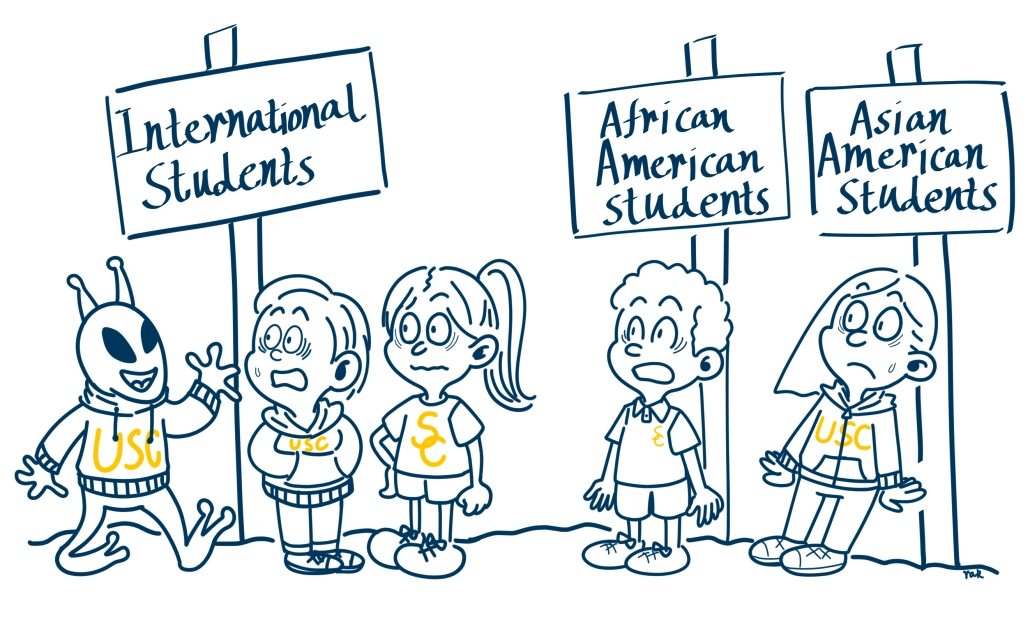FOREIGN FOOTPRINTS
All international students aren’t the same
Often, people fail to acknowledge the subgroups under being international.
Often, people fail to acknowledge the subgroups under being international.


Hello, my dear readers. Today’s piece is slightly different from my usual “it sucks to be an international student but not really because look at the bright side!” commentary. Today, there isn’t a transition from a sad to a happy mood. Today, I am just plain mad.
A few weeks ago, someone pointed out to me that on the USC Facts and Stats page for the incoming freshman class, “international” was listed as an ethnicity. I let out a dry chuckle, because what else can you do but laugh at this absurdity. Federal regulations are responsible for this ignorance of different backgrounds, countries and cultures that each international student comes from, so it’s no surprise that people mirror the same behavior.
Let me clarify something right off the bat — I haven’t experienced overt racism here. It’s more microaggressive, where people’s implicit biases lead to certain behavior that makes others feel uncomfortable in their own skin. Unfortunately, these people are often unaware that they are being racist, because, well, they are trapped in their little bubble and don’t have much exposure to other cultures. So, even though some really try to be culturally appropriate, they don’t realize the deep impact even their smallest actions hold.
For example, my friend Michelle Kwon, who is of Korean descent and lived there for 5 years before college, mentioned she has seen people unintentionally make some controversial statements regarding East Asians and just group them together in one broad umbrella category. A few friends have asked her “what type of Asian” she was or if she was from “North or South Korea,” which surprised her because she didn’t expect students at USC to make such statements.
I was, perhaps, the most shell-shocked when she told me one of her current professors confuses the names of East Asian students from different countries because she thinks they are the same person, even though they clearly have different physical features.
But, it’s not even about caucasians being blatantly unaware because even some people of color have prejudices. A second-generation immigrant from India once assumed that I came from a business family because how else would an Indian afford an expensive private school like USC? I still clearly recall his look of surprise tinged with mild embarrassment when I told him that my parents, and in my experience those of a majority of Indians at USC, are actually salaried professionals.
These incidents are surprising because we are in California, where everyone talks about being woke. But, I guess, that’s all it is — talk.
On one hand, California and USC boast about their diverse culture, yet, they don’t bother to know the complexities of their diverse population and rather just dump them all into one box labeled “different.” These mixed signals are confusing because I don’t know if I should be proud of my distinct identity or if I am just another tick mark for this diversity box, with no one really caring how my heritage is actually different from that of other international students.
I don’t think that me sharing these experiences and the impact it has on us will lead to the federal guidelines about education institutions reporting their class demographics changing — I am not that naive. But, I do hope that it would encourage us all to be aware of the fact that all international students aren’t the same.
We have to look beyond overarching umbrella categories, and instead, acknowledge that under each of these groups, there are multiple subgroups. Just because we aren’t American, doesn’t mean we are all the same. Just like people from Texas have very different experiences from people in California, people from China have different experiences from people from Japan and not every brown person on this planet is from India.
And before I am accused of hyper-wokeism, I want to clarify that the point of this piece isn’t to expect people to now be able to tell Asians from different countries apart. Rather, I want people to be conscious of the fact that all international students belong to different countries and have different experiences. Just know that we may be people of color, but within this umbrella it is important to make the distinction that we are all our own people, with our own history and experiences, and to generalize means you are snatching that away from us.
Edhita Singhal is a sophomore from India writing about her experiences as an international student in her column, “Foreign Footprints,” which runs every other Tuesday.
We are the only independent newspaper here at USC, run at every level by students. That means we aren’t tied down by any other interests but those of readers like you: the students, faculty, staff and South Central residents that together make up the USC community.
Independence is a double-edged sword: We have a unique lens into the University’s actions and policies, and can hold powerful figures accountable when others cannot. But that also means our budget is severely limited. We’re already spread thin as we compensate the writers, photographers, artists, designers and editors whose incredible work you see in our daily paper; as we work to revamp and expand our digital presence, we now have additional staff making podcasts, videos, webpages, our first ever magazine and social media content, who are at risk of being unable to receive the support they deserve.
We are therefore indebted to readers like you, who, by supporting us, help keep our paper daily (we are the only remaining college paper on the West Coast that prints every single weekday), independent, free and widely accessible.
Please consider supporting us. Even $1 goes a long way in supporting our work; if you are able, you can also support us with monthly, or even annual, donations. Thank you.
This site uses cookies. By continuing to browse the site, you are agreeing to our use of cookies.
Accept settingsDo Not AcceptWe may request cookies to be set on your device. We use cookies to let us know when you visit our websites, how you interact with us, to enrich your user experience, and to customize your relationship with our website.
Click on the different category headings to find out more. You can also change some of your preferences. Note that blocking some types of cookies may impact your experience on our websites and the services we are able to offer.
These cookies are strictly necessary to provide you with services available through our website and to use some of its features.
Because these cookies are strictly necessary to deliver the website, refusing them will have impact how our site functions. You always can block or delete cookies by changing your browser settings and force blocking all cookies on this website. But this will always prompt you to accept/refuse cookies when revisiting our site.
We fully respect if you want to refuse cookies but to avoid asking you again and again kindly allow us to store a cookie for that. You are free to opt out any time or opt in for other cookies to get a better experience. If you refuse cookies we will remove all set cookies in our domain.
We provide you with a list of stored cookies on your computer in our domain so you can check what we stored. Due to security reasons we are not able to show or modify cookies from other domains. You can check these in your browser security settings.
These cookies collect information that is used either in aggregate form to help us understand how our website is being used or how effective our marketing campaigns are, or to help us customize our website and application for you in order to enhance your experience.
If you do not want that we track your visit to our site you can disable tracking in your browser here:
We also use different external services like Google Webfonts, Google Maps, and external Video providers. Since these providers may collect personal data like your IP address we allow you to block them here. Please be aware that this might heavily reduce the functionality and appearance of our site. Changes will take effect once you reload the page.
Google Webfont Settings:
Google Map Settings:
Google reCaptcha Settings:
Vimeo and Youtube video embeds:
The following cookies are also needed - You can choose if you want to allow them:
